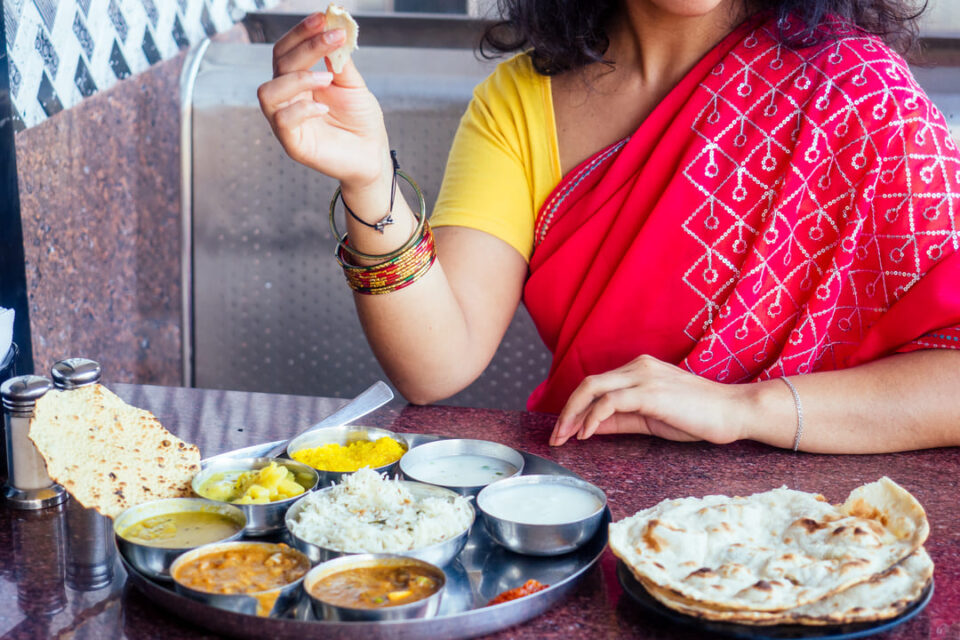Every bite rewrites your body’s operating system.
Every morsel of dal, every grain of brown rice, every leaf of spinach in your palak paneer – they’re all engaging in a complex dance with your genes, shaping your health in ways we’re only beginning to understand.
The Spice of Life (and Genes)
Remember when your grandmother insisted on adding a pinch of turmeric to everything? It turns out she was on to something big. Recent research from the All India Institute of Medical Sciences has shown that curcumin, the active compound in turmeric, can influence over 700 genes in our body. It’s like a master switch, turning on genes that fight inflammation and turning off ones that promote it.
But it’s not just turmeric. The cloves in your chai, the cinnamon in your gajar ka halwa, the garlic in your tadka – all whispering to your genes, coaxing them to work in your favour.
Brain Food: Not Just an Expression
Let’s talk about your brain for a moment. That three-pound marvel sitting between your ears? It’s hungry. And it’s picky about what it eats.
A study from the National Brain Research Centre in Manesar found that a diet rich in omega-3 fatty acids – found abundantly in fish like hilsa and mackerel – can enhance cognitive function and potentially stave off age-related mental decline. It’s as if these foods give your neurons a pep talk, encouraging them to form more robust, faster connections.
And it’s not just fish. The humble walnut, shaped like a miniature brain, lives up to its appearance. Packed with antioxidants and healthy fats, it’s been shown to improve memory and learning capacity. So, the next time you crush some walnuts for your akhrot ka halwa, know that you’re crushing it for your brain, too.
The Gut-Gene Connection
Now, let’s journey south to your gut. It’s home to trillions of microbes, collectively known as your microbiome. These tiny tenants aren’t freeloaders; they pay rent by influencing your genes.
Research from the National Centre for Cell Science in Pune has revealed that gut bacteria can modify the expression of genes. A fibre-rich diet – whole grains, lentils, and vegetables – promotes a diverse and healthy microbiome. This, in turn, can activate genes that boost your immune system and even influence your mood.
It’s a fascinating thought. The dal-chawal on your plate today could be shaping your health and happiness tomorrow.
Longevity on a Leaf
Speaking of tomorrow, let’s discuss living a longer, healthier life. The secret might be hiding in plain sight—on your dinner plate.
A landmark study from the International Centre for Genetic Engineering and Biotechnology in New Delhi found that certain compounds in fruits and vegetables can lengthen your telomeres. Telomeres are like the protective caps at the end of your chromosomes; their length is associated with longevity.
You’re not just satisfying your taste buds when chewing on a juicy jamun or savouring some saag. You’re potentially adding quality years to your life.
The Dark Side of Delight
But it’s not all good news. Just as the right foods can tune up your genetic orchestra, the wrong ones can create dissonance.
Excessive consumption of processed foods, refined sugars, and unhealthy fats can trigger genes associated with inflammation and chronic diseases. It’s like playing a wrong note – it throws off the entire symphony of your health.
A study from the National Institute of Nutrition in Hyderabad found that a diet high in processed foods and low in fruits and vegetables was associated with increased expression of genes linked to type 2 diabetes. It’s a sobering reminder that every bite counts.
The Spice Route to Better Health
What’s the takeaway from all this? Should we all switch to a diet of turmeric-spiced walnuts and fish? Not quite.
The beauty of Indian cuisine lies in its diversity. Our traditional thali, with its variety of dishes, colours, and nutrients, is a perfect example of balanced eating. It’s not about any single superfood but rather the symphony of nutrients working together.
Here are some practical tips to harness the gene-modulating power of your diet
1. Embrace whole foods
Choose brown rice over white, whole wheat atta over maida.
2. Spice it up
Don’t shy away from traditional spices. They’re not just for flavour – they’re medicine in disguise.
3. Go green (and red, and yellow)
Fill half your plate with a rainbow of fruits and vegetables. Each colour represents different phytonutrients that can influence your genes in unique ways.
4. Befriend healthy fats
Include sources of omega-3s like fish, walnuts, and flaxseeds in your diet. Your brain cells are already doing a happy dance.
5. Ferment for health
Traditional fermented foods like idli, dosa, and pickle are packed with probiotics that can positively influence your gut microbiome and, by extension, your genes.
6. Too much is too bad
Even too much of a good thing can be harmful. Balance and variety are the cornerstones of a gene-friendly diet.
How Your Dinner Talks to Your DNA
As we study nutrigenomics—how food interacts with our genes—more profoundly, we uncover new insights daily. It’s an exciting time in nutrition science, and India is at the forefront of much of this research.
A recent study from the Institute of Genomics and Integrative Biology in Delhi explores how our genetic makeup might influence our response to different diets. In the future, we can tailor dietary recommendations based on an individual’s genetic profile.
But until then, we have a powerful tool at our disposal – the wisdom of our traditional cuisine, backed by modern science. Every meal is an opportunity to influence your health at the most fundamental level.
You’re not just feeding your body. You’re programming your genes, nourishing your brain, and potentially adding years to your life. Choose wisely, eat joyfully, and let every morsel be a step towards better health.
After all, the power to transform your health is on your plate.

